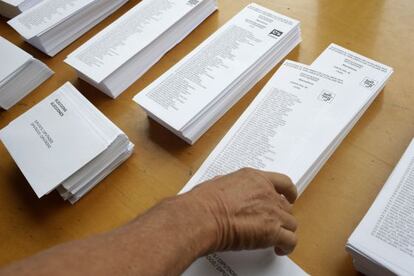Five ways of interpreting the results of the Catalan elections
The different possible majorities and the difficulty of choosing a leader are all key elements

Sunday’s elections will shape a new regional parliament in Catalonia, but one that will probably not last four years.
Pro-independence parties have already announced that if they win a majority of seats, there will be new elections in 18 months. And voters could be called to the polls even earlier if no cross-party agreement is reached to invest the new Catalan premier.
This is particularly likely given the apparent fragility of the alliances among the parties that make up the secessionist bloc – a weakness that would also affect any hypothetical deals between detractors of independence.
In such a scenario, Catalonia seems set to go through a period of political instability. These are some of the keys to understanding the results of the September 27 elections:
- Degree of support for independence. All surveys indicate that Junts pel Sí (Together for Yes), a coalition made up chiefly of Democratic Convergence of Catalonia (CDC) and the Catalan Republican Left (ERC), will be the most voted force in the region. This would bolster the secession plans announced by Catalan premier Artur Mas, who is running fourth on the Junts pel Sí ticket. But in order to launch his plans, Mas needs more than a simple victory: he needs an absolute majority of seats, that is to say, half plus one. Another way to reach these 68 seats is to convince another secessionist contender, CUP, to support him by adding their seats to his. If secessionists fall short of this number, the independence bid will grind to a halt. If they achieve it, they will press ahead with their plans, albeit outside the law.
One possible scenario is for Junts pel Sí and CUP to jointly reach an absolute majority of seats but not of votes
- The difference between votes and seats. One possible scenario is for Junts pel Sí and CUP to jointly reach an absolute majority of seats but not of votes. This is made possible by the electoral law, which makes some votes worth more than others. This would create two problems: first, Mas’ victory message would be significantly undermined, especially to outside observers; second, CUP representatives have repeatedly said that an absolute majority will only be legitimate if it is in number of votes as well as seats. And CUP’s support could be essential to the launch of the breakaway process.
- How detractors of independence measure up against each other. The parties that do not defend independence are waging a tough battle to lead the unionist bloc and be first in line to head the regional government, should secessionists fail to reach an absolute majority. This election will gauge the relevance of Ciudadanos (which is the best-positioned of the non-secessionist parties, according to voter surveys); it will also test the Catalan Socialist’ ability to revert their decline of recent years after being a major player in regional politics. The results will also confirm whether the conservative Popular Party (PP) loses ground, as it is expected to do, and just how much sympathy voters have for Catalunya Sí que es Pot, a leftist bloc that includes the anti-austery Podemos. Another unknown factor is whether Democratic Union of Catalonia (UDC), CDC’s longtime partner in government for nearly four decades as CiU, will manage a presence in the regional parliament after its breakup with CDC this past summer due to insurmountable disagreements over independence.
-Votes in each territory. The pro-independence discourse calls for the Catalans' “right to decide.” That is why it is important to analyze the result in each of the four Catalan provinces. Girona and Lleida are traditionally those which lend more support to the pro-ssovereignty movement; Tarragona and Barcelona (which together account for 85% of the population of Catalonia) less so.
-Possible investiture pacts. In principle, Artur Mas is guaranteed to be voted in as regional premier on the first vote should his Junts pel Sí win with an absolute majoirty. But that is the only situation in which that could happen. If he doesn’t win a majority and needs the support of the CUP, he will have a problem: the CUP has said it will not vote Mas in as premier. The remaining parties running in Sunday’s elections - Catalunya Sí que es Pot, the Socialists (PSC), Ciudadanos, the Popular Party and Unió - have all said the same: that none of them would vote for Mas. A series of negotiations would then begin to find someone who could achieve a consensus. If it is not reached, Mas could be instated during a second round of voting with a simple majority, but he would need more votes in favor than against. In such a scenario, if the CUP abstained, Mas would need to win more votes than a candidate from the anti-independence parties. If there is no agreement, new elections would have to be called.
English version by Susana Urra and Simon Hunter
Tu suscripción se está usando en otro dispositivo
¿Quieres añadir otro usuario a tu suscripción?
Si continúas leyendo en este dispositivo, no se podrá leer en el otro.
FlechaTu suscripción se está usando en otro dispositivo y solo puedes acceder a EL PAÍS desde un dispositivo a la vez.
Si quieres compartir tu cuenta, cambia tu suscripción a la modalidad Premium, así podrás añadir otro usuario. Cada uno accederá con su propia cuenta de email, lo que os permitirá personalizar vuestra experiencia en EL PAÍS.
En el caso de no saber quién está usando tu cuenta, te recomendamos cambiar tu contraseña aquí.
Si decides continuar compartiendo tu cuenta, este mensaje se mostrará en tu dispositivo y en el de la otra persona que está usando tu cuenta de forma indefinida, afectando a tu experiencia de lectura. Puedes consultar aquí los términos y condiciones de la suscripción digital.









































